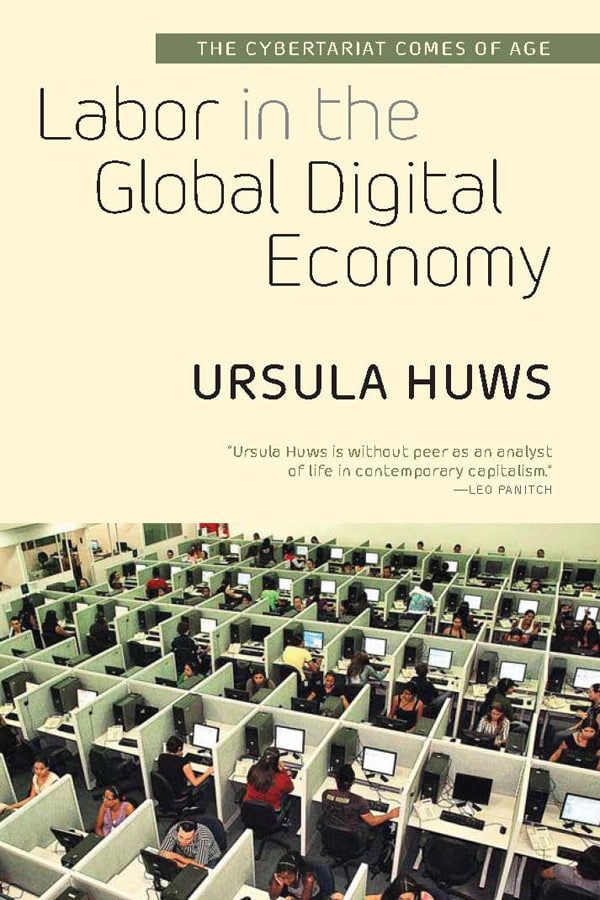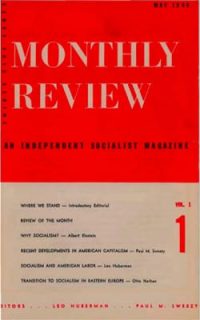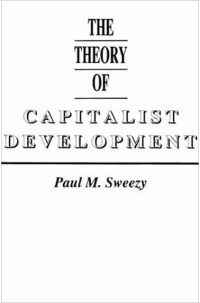Labor in the Global Digital Economy: The Cybertariat Comes of Age
$16.00 – $75.00
For every person who reads this text on the printed page, many more will read it on a computer screen or mobile device. It’s a situation that we increasingly take for granted in our digital era, and while it is indicative of the novelty of twenty-first-century capitalism, it is also the key to understanding its driving force: the relentless impulse to commodify our lives in every aspect.
Ursula Huws ties together disparate economic, cultural, and political phenomena of the last few decades to form a provocative narrative about the shape of the global capitalist economy at present. She examines the way that advanced information and communications technology has opened up new fields of capital accumulation: in culture and the arts, in the privatization of public services, and in the commodification of human sociality by way of mobile devices and social networking. These trends are in turn accompanied by the dramatic restructuring of work arrangements, opening the way for new contradictions and new forms of labor solidarity and struggle around the planet. Labor in the Global Digital Economy is a forceful critique of our dizzying contemporary moment, one that goes beyond notions of mere connectedness or free-flowing information to illuminate the entrenched mechanisms of exploitation and control at the core of capitalism.
Following on her brilliant The Making of a Cybertariat, a modern classic in the analysis of class and gender, work and consumption, Huws turns her sharp eye to the present crisis into which the cybertariat ‘has come of age.’ Rich in theoretical and methodological insights, Labor in the Global Digital Economy carefully guides us through the world of transnational business, value chains, creative, precarious and knowledge labor, self-service consumers, and consumption workers. Challenging accepted thinking and providing enough wisdom to fill several volumes, Huws has once again demonstrated her preeminence among analysts of work and inequality in digital capitalism.
—Vincent Mosco, author, To the Cloud: Big Data in a Turbulent World
Ursula Huws is a global treasure: her essays collected here continue her several decades of scholarship analyzing the impact of technological change on women and workers. This book brings her prescient Marxist feminist theorizing to a wider audience. It is a must read for anyone who cares about what the future holds for workers in the digital era.
—Gina Neff, author, Venture Labor: Work and the Burden of Risk in Innovative Industries
As always, Huws has a treasury of insights to offer. Use this book as a manual for understanding how the alliance of capital and digitization is reshaping the landscape of labor.
—Andrew Ross, author, Creditocracy and the Case for Debt Refusal
Ursula Huws is without peer as an analyst of life in contemporary capitalism.
—Leo Panitch, York University; editor, Socialist Register
Huws (Univ. of Hertfordshire, UK) has written a book that deserves a place of honor among the many recent books on globalization—some praise globalization’s benefits and others criticize the impositions it forces on people and communities. Huws’s thesis is that the global digital economy is changing the nature of work itself, and she explores the contradictory pressures of these changes: much work is reduced to standardized, quantifiable tasks at the same time workers are encouraged to “think outside the box” and simultaneously expected to work as part of the “team” (an expectation that typically means staying within the confines of the box). This reshaping of the labor process often leads to the kind of organization that prevents learning on the job or opportunities to take advantage of those skills workers might contribute in the absence of rigid standardization of tasks. These changes also prepare the way for outsourcing work. Huws does an excellent job of showing how this reshaping increases costs and decreases the quality of public sector work. All the while, she manages to inform readers about how these new trends work to diminish the overall quality of life.
—M. Perelman, California State University, Chico
Ursula Huws is Professor of Labour and Globalisation at the University of Hertfordshire in the UK, and founder of Analytica Social and Economic Research. She is the author of The Making of a Cybertariat: Virtual Work in a Real World.
Publication Date: December 2014
Number of Pages: 208
Paperback ISBN: 9781583674635
Cloth ISBN: 9781583674642
eBook ISBN: 9781583674659
Related products
-
Monthly Review Volume 2, Number 9 (January 1951) [PDF]
$10.00 Add to cart -
Monthly Review Volume 2, Number 6 (October 1950) [PDF]
$10.00 Add to cart -
Monthly Review Volume 1, Number 11 (March 1950) [PDF]
$10.00 Add to cart -
Monthly Review Volume 1, Number 3 (July 1949) [PDF]
$10.00 Add to cart -
Monthly Review Volume 1, Number 1 (May 1949) [PDF]
$10.00 Add to cart -
The Theory of Capitalist Development: Principles of Marxian Political Economy
$20.00 Select options This product has multiple variants. The options may be chosen on the product page

![Monthly Review Volume 2, Number 9 (January 1951) [PDF]](https://monthlyreview.org/wp-content/uploads/2015/09/Monthly Review Volume 2, Number 9 (January 1951) [PDF].jpg)
![Monthly Review Volume 2, Number 6 (October 1950) [PDF]](https://monthlyreview.org/wp-content/uploads/2015/09/Monthly Review Volume 2, Number 6 (October 1950) [PDF].jpg)
![Monthly Review Volume 1, Number 11 (March 1950) [PDF]](https://monthlyreview.org/wp-content/uploads/2015/09/Monthly Review Volume 1, Number 11 (March 1950) [PDF].jpg)


